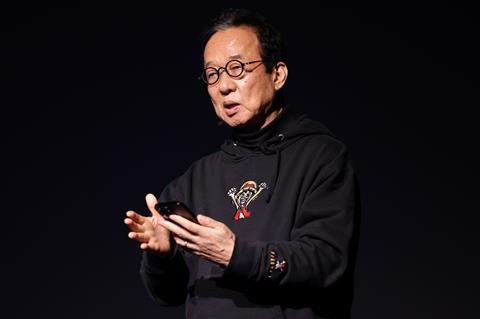
Film and TV adaptations of Japanese IP are showing significant international growth with no signs of slowing, according to research revealed by One Piece executive producer Tetsu Fujimura at TIFFCOM today.
The CEO of Filosophia, a consultancy and production firm that connects Japanese IP owners with leading Hollywood producers, unveiled the original research during his keynote seminar at the Tokyo market.
He highlighted that IP-based films have come to dominate the global box office over the past 45 years. In 1978, some 20% of top 30 box office titles were based on existing IP. In 2024, that figure has grown to nearly 90%.
In 2024, two films in the top 10 worldwide box office – Godzilla x Kong: The New Empire and Sonic The Hedgehog 3 – were based on Japanese IP, while in 2025, films made directly in Japan such as have been huge box office hits internationally.
Animated feature Demon Slayer: Infinity Castle has grossed nearly $670m worldwide – the biggest ever for an anime film – while Chainsaw Man – The Movie: Reze Arc is at $108m after opening in major markets last weekend.
“Many anime films are making more money abroad than in Japan, making them truly global content,” said Fujimura.
The research showed a sizable growth in the number of global film and TV adaptations of Japanese IP from 23 titles in the 1990s, including live-action adaptations of video games Street Fighter and Super Mario Brothers, to 45 in the 2000s, including The Ring, Speed Racer and Resident Evil.
Ghost In The Shell, executive produced by Fujimura, was one of 85 adaptations in the 2010s while there have been 69 titles to date in the 2020s, with more than 60 additional titles yet to come such as the upcoming Legend Of Zelda feature.
Since 2020, six of those films or TV series were produced in Europe, 24 in Hollywood and 39 in Asia. Among them are Netflix’s live-action adaptation of One Piece, which Fujimura also executive produced, which has two further seasons in the pipeline.
In terms of the original IP source, the US and Europe tend to base their adaptations on video games (51%) followed by manga (19%) and Japanese films (16%). The reason anime makes up only 5% of source formats, explained Fujimura, is because most anime is itself based on manga, making most Western adaptations technically based on manga.
It is a very different breakdown in Asia where most adaptations are based on manga (41%) followed by TV series (29%) and novels (19%). Video games only account for 1% of Asian adaptations, perhaps because they are generally large-scale stories requiring Hollywood-level budgets.
In Asia, most adaptations of Japanese IP are made in South Korea (51%) followed by China (34%), Taiwan (22%) and Thailand (10%).
Fujimura predicted that entertainment will soon surpass automobiles as Japan’s core industry, stating that the combined market capitalisation of the top nine entertainment companies in the country has surpassed that of the top nine car manufacturers.
He also highlighted Sony’s recent statement that it will not look to acquire Warner Bros, eyeing more growth for Japanese IP and the global market for anime than the catalogue of the US studio.
Fujimura further noted that while acquisition to date has been focused on major IP, attention is now turning to “titles that might not be as known yet, but with incredible potential”.
“Momentum across novels, light novels and even indie games [is] creating even greater opportunities for everyone here today to work with Japanese IP,” he added.
Fujimura is known for co-founding Gaga Communications in 1986 before stepping down and launching Filosophia in 2006 to serve as a bridge between Japanese IP holders and Hollywood studios.
One of his first key relationships in Hollywood was with Avi Arad, the founder of Marvel Studios who had recently founded Arad Productions when the two first met in the early 2000s. Fujimura helped Arad secure the rights to manga Ghost in the Shell after a three-year negotiation, and the adaptation was completed in 2017.
More recently, Fujimura has delved into TV, helping producer Marty Adelstein secure the rights to best-selling manga One Piece, which was adapted up for Netflix. Bringing in One Piece creator Eiichiro Oda as executive producer and making the live-action series “creator-first” helped make it one of the first Western adaptations of manga to receive acclaim from fans, said Fujimura.
“Oda wrote a heartfelt letter to the fans asking them to give the cast a chance, and that he’d personally approved them in the audition process,” said Fujimura. “That’s what helped us earn a 95% audience score on Rotten Tomatoes.”
























No comments yet